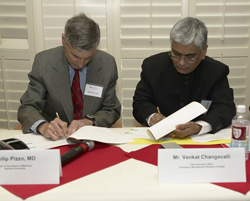May 9, 2007 - By Ruthann Richter
STANFORD, Calif. - Though it's the world's second-most-populous nation, India has never had a coordinated system for responding to medical emergencies. Now the Stanford University School of Medicine is entering into a partnership with an Indian enterprise to help the country bring a sweeping 911-type emergency response system to life.
Philip Pizzo, MD, dean of the Stanford School of Medicine, signed an agreement May 9 with a nonprofit group called the Emergency Management Research Institute, based in Hyderabad, India, to train the country's new corps of paramedics. EMRI was launched in 2005 to serve the 80 million residents of the southern Indian state of Andhra Pradesh. Officials say the goal is to extend the program to India's entire population of 1 billion by 2009.

Dean Philip Pizzo (left) and Venkat Changavalli sign the agreement May 9 at Stanford.
"For much of India - and the developing world - emergency medical services that we take for granted in the United States are not available, and calls for help go unheeded," said emergency physician S.V. Mahadevan, MD, assistant professor of surgery at Stanford and director of the new training program. "All of us with ties to India can recite an incident where a family member or friend met an untimely demise because of a lack of pre-hospital care."
In a little more than a year, EMRI already has responded to roughly 250,000 emergencies and saved more than 9,500 lives, said Venkat Changavalli, CEO of the group, during a breakfast meeting at Stanford Hospital to celebrate the new partnership. The breakfast was attended by some 40 officials from Stanford and India, including Y.S. Rajasekhara Reddy, MD, Honorable Chief Minister of Andhra Pradesh.
EMRI, which has gained the backing of the state government, has purchased and equipped more than 500 ambulances, and developed a sophisticated, state-of-the-art call center that handles more than 15,000 calls each day, Changavalli said. All ambulance and pre-hospital care is provided free of charge. A mix of private and government funding supports the program.
Still, the system faces a severe shortage of skilled paramedics who can man the ambulances and effectively respond to calls. Under the agreement with EMRI, Stanford physicians will develop an educational curriculum and train 150 paramedics and 30 paramedic instructors over a two-year period in India. The program is expected to begin in July.
"We will learn from the experience of a country where an emergency medical system has been in place for more than 40 years. And we will learn from Stanford University, which has become iconic in terms of its educational and research capabilities," said Indian entrepreneur and EMRI founder Ramalinga Raju, chairman of Satyam Computer Sciences, based in Hyderabad.
Dean Pizzo said the new partnership is part of major new effort, called the Stanford Challenge, in which the university works to improve global health by reaching out to other parts of the world. "We're committed to transforming the lives of those in our communities - locally, nationally and globally," he said.
Pizzo said the medical community in the United States also stands to gain from the new partnership. "We will learn things on how to improve emergency medicine that will be brought back here," he said.
Mahadevan, who has served as an advisor to EMRI since its inception, already has experience training medical personnel in India. He led a Stanford-based group of physicians who taught India's first course in pre-hospital care to a group of trainees in 2005. Sixteen paramedics graduated from the program and are now working in the medical care system, he said.
He said the Stanford team learned a number of important lessons from its experience, including the need to develop a curriculum that can reach beyond cultural and language barriers.
"You just can't take a U.S. system and rubber stamp it and say we'll apply this to India," he said. "What you really need to be able to do is take the best aspects of the U.S. system and develop a model that is specific for the country you're in - in this case, India. Having the support of the government and the local citizens has been very important as well."
In addition to training paramedics, the Stanford group will teach paramedic educators in India who can carry on the work of instructing the next generation of advanced emergency medical technicians.
Other members of the Stanford team include emergency physicians Matthew Strehlow, MD, Gregory Gilbert, MD, Peter D'Souza, MD, and Alice Chaio, MD; and paramedic educator Mary Koskovich.
About Stanford Medicine
Stanford Medicine is an integrated academic health system comprising the Stanford School of Medicine and adult and pediatric health care delivery systems. Together, they harness the full potential of biomedicine through collaborative research, education and clinical care for patients. For more information, please visit med.stanford.edu.